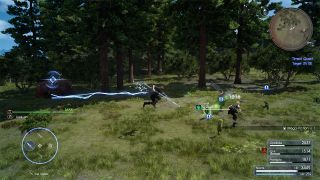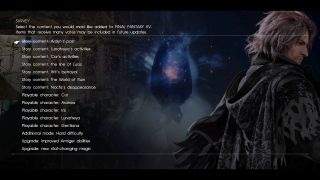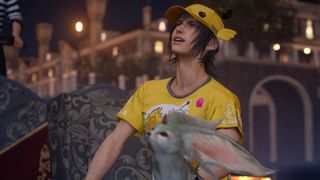Final Fantasy 15 is… strange. While the series has dabbled in online gaming with its two MMOs (most notably Final Fantasy 14, aka the greatest redemption story ever told), its single-player adventures have been decidedly offline affairs - up until now. In addition to receiving patches that added new story content (including a secondary path through the notorious Chapter 13), along with Episode Gladiolus from the season pass, Final Fantasy 15 has held a limited-time-only Chocobo Festival, added timed quests in the form of additional hunts, complete with special in-game rewards, and is holding monthly photo contests. Final Fantasy 15 has changed dramatically since its November launch, finding new ways to bridge the gap between its offline story and a larger online audience, and it'll probably change even more come the one-year anniversary. Strangest of all, I'm way more into the idea than I thought I'd be.
Final Fantasy 15 is a totally different beast
When I finished Final Fantasy 15 for my review in the days leading up to release, I had expected that, other than the occasional DLC mission or tech fix, my experience was generally going to be the state of Final Fantasy 15. This is how Square Enix has always approached its single-player RPGs: pop in a copy of Final Fantasy 7 on the PS1 and you'll find the same game you played 20 years ago, grammatical "this guy are sick" errors and all. Even the Final Fantasy 13 trilogy went largely unchanged, save for a handful of DLC packs you can buy. But the months following Final Fantasy 15's launch saw a host of tweaks and additions, like the ability to increase your character levels beyond 99, a New Game+ option, and even limited-time events and quests. The quests are particularly interesting, because they're curated battles in specific areas of the game's world, and completing them allows you to upload your score to an online leaderboard and redeem points for exclusive rewards. It's like turning Final Fantasy 7 on and finding another brand-new super-powerful Weapon to fight - but you only have a week to take it out.

It's weird, especially for someone who's been a fan of the series since the SNES days. For a while, I questioned why Square Enix was even bothering - it already has fans' money, and the story is essentially done, so why bother adding more stuff to it? Then I found myself playing these timed quests for hours, running to and fro, fighting enemies, and chasing high scores. I'd been planning on replaying Final Fantasy 15 at some point (as I always do with the games I like), but the constant stream of updates has ensured that I keep checking back in just to see what's new, and getting fresh stuff to mess with during a second playthrough of the game's story has made the draw to return more alluring.
And then it dawned on me: this is how Final Fantasy stays relevant in the modern era. Big games can no longer be released as one-and-done stories without either losing money or significantly shrinking their scope. Corporations don't want to do the former, and consumers hate when big-budget games do the latter. Instead, many publishers are opting to go the "games as service" route, arriving with a steady stream of free and paid updates so the games can constantly find itself as a part of the conversation. The problem with this is that it's easy to miss out on content if you're not following along every single day, and once the servers get shut down, most of what makes that game unique is gone - if you can even play it any more at all. While Final Fantasy 15's take on the model won't work for everyone, it certainly helps it to retain its offline identity while giving it new life in the months following release.
Where did the idea come from?
The idea to implement Final Fantasy 15's timed quests came from how players reacted to the Japan-only 'Judgement Disc' demo. We spoke to lead game designer and multiplayer DLC director Kazuya Takahashi, who explained its genesis: "The content of this demo was extremely restricted in that you could only play until the middle of Chapter One. Yet even then, it was popular among players who ended up finding the hidden Bandersnatch boss, spreading information regarding its location all over Twitter and uploading low-level quest and time attack videos online." The team looked at all this fan-generated content and decided to just implement it into the game, complete with exclusive, game-enhancing rewards.
"It is the development team’s sincere belief that responding to these requests as much as possible is the best way to ensure that our players continue playing."
-Kazuya Takahashi
Now, when you boot up Final Fantasy 15, you're not just getting a single-player story; you're competing against everyone else in the world who's pursuing these timed quests. But unlike games like Destiny or larger MMOs like Final Fantasy 14, where these events are a core part of the experience, Final Fantasy 15's timed quests exist in the periphery. They're there for you to dig into if you want, or to ignore if you don't. Even January's limited-time Chocobo Festival, with its mini-games and exclusive dishes (which will unlock for use in the main game once you eat them) existed in a separate option on the title screen, acting as a special bonus for fans but completely invisible if you don't want to engage with that stuff. And if you missed it, well, you didn't miss out on anything that would fundamentally change your perception of Final Fantasy 15's story, and the special festival costumes are just free DLC that you can wear whenever you want anyway. Takahashi wants to host similar carnivals in the future, too, so you might have another shot to check out the next one.
There's even an off-road buggy coming - which sounds like all kinds of stupid fun.
Why even do this?
I got to thinking why Square Enix would even bother updated their game with free, live content. The official line from Takahashi is that the team has "received many requests from fans saying that they’d like to know more about the stories that weren’t depicted in the game or that they’d like to explore other locations in Eos", and that responding to those requests will ensure people keep playing. But these live events aren't strictly DLC - many of them arrive in the form of patches automatically downloaded to your console for free.
And then, Final Fantasy 15 got an update late May, with a survey asking players what they want to see next.

Players could choose one option from the list, which included new story content about its villain, Ardyn Izunia, or the ability to spend more time in the World of Ruin in the game's last few chapters. But rather than feeling like a curveball thrown from a studio suddenly asking players what they want to play, it's a natural extension of the updates the team has already delivered.
Director Hajime Tabata has stated that there are currently no plans to make sequels to Final Fantasy 15 like Square Enix previously did with the Final Fantasy 13 trilogy - instead, it appears that new stories will simply be added to the base game as free or paid DLC. This survey is a declarative statement that Final Fantasy 15 isn't a game that's simply going to disappear once you finish it, but rather a game that will grow and flourish over time. The live events and hunts help to solidify that.
What happens when the servers go away?
The real problem with trying to create single-player games as a "service" comes when the online functionality inevitably comes to a close. When everyone who played Destiny moves on to its sequel, Activision will eventually turn the game off, effectively destroying an entire virtual universe. Even a single-player game like Metal Gear Solid 5: The Phantom Pain has a service model built into its online FOB system (allowing players to raid each others' bases for money and resources), and it's a core part of the game's balance and functionality. Take it out, and suddenly it becomes much more difficult to build up your arsenal and complete story missions without grinding (not to mention all the references to it in-game would need to be removed or altered - along with specific moments along the main storyline). These games' identities live online, and without that server-supported backbone, a large part of the experience is lost.

Final Fantasy 15 is different, though - its online hooks are additive, rather than cohesive. There are bonuses for engaging with the content, of course, and the future multiplayer DLC, in whatever form it takes, will probably represent the culmination of these additions. But if the online servers were to suddenly get switched off, you wouldn't be left with half a game - you'd just be missing a small portion of what made the game interesting in a specific moment in time. Players revisiting Final Fantasy 15 decades from now will still get a complete, original, and fully-balanced single-player experience, regardless of whether or not Square Enix is still doling out timed quests - which, given how quickly things move on the internet, might be unlikely even a couple years from now.
But that's still awhile away to worry about now. The question of how we preserve those online experiences continues to be a hotly contested debate, and it's a question we may never really have the answer to. In the meantime, I'm enjoying dipping back into Final Fantasy 15, fighting monsters and building up enough points to buy a magical greatsword that plays electronic music while I wait for the rest of the season pass content to arrive. In a sense, I'm enjoying the idea that Final Fantasy 15 doesn't really have to end - at least for now.



